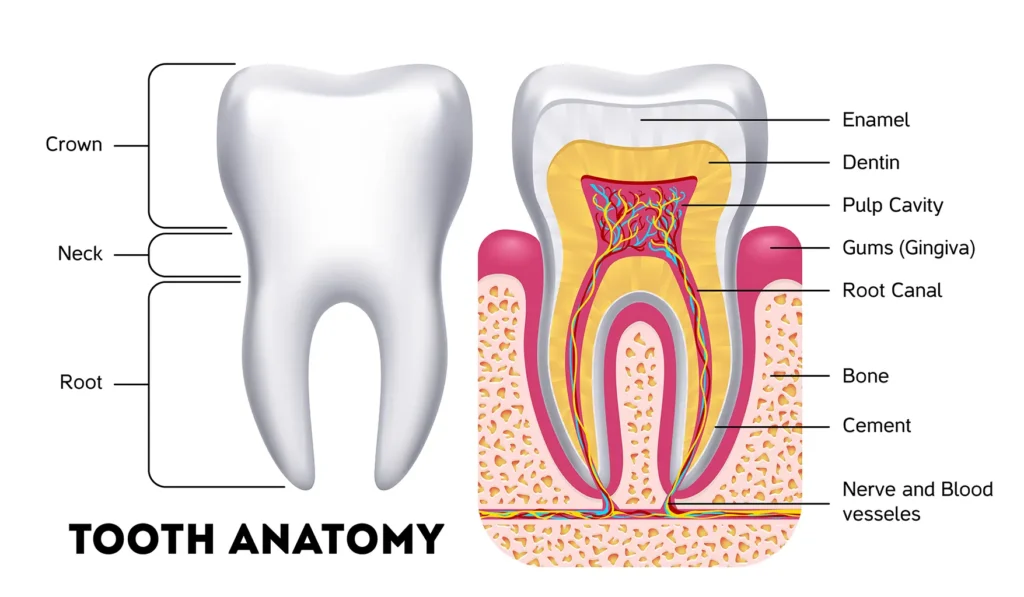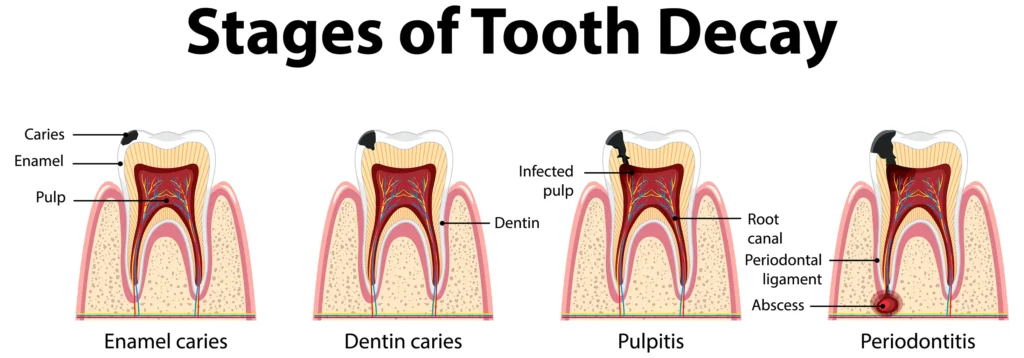Tooth decay is a prevalent dental issue affecting people of all ages. It occurs when the enamel, the outer layer of the tooth, is damaged by acids produced by bacteria in the mouth. These bacteria feed on sugars from foods and drinks, leading to the formation of plaque, a sticky film that clings to the teeth. If left untreated, tooth decay can lead to cavities, tooth loss, and other serious dental problems.

What Is Tooth Decay?
Tooth decay is a progressive condition that occurs in several stages. Understanding these stages can help you recognize and address the problem early:
- Initial Demineralization: The first stage involves the loss of minerals from the tooth’s enamel. This can occur when acids produced by plaque bacteria attack the enamel. At this stage, white spots may appear on the tooth’s surface, indicating early decay.
- Enamel Decay: If the demineralization process continues, the enamel begins to break down, leading to the formation of small cavities. This stage might not cause pain, but it’s crucial to address it early to prevent further damage.
- Dentin Decay: As the decay progresses, it reaches the dentin, the layer beneath the enamel. Dentin is softer than enamel and more susceptible to acid damage. At this stage, cavities become more significant, and you might experience sensitivity or pain.
- Pulp Damage: If left untreated, it can reach the pulp, the innermost part of the tooth containing nerves and blood vessels. This can cause severe pain, infection, and even tooth loss if left untreated.
- Abscess Formation: In the most advanced stage, the infection can spread to the root of the tooth, leading to the formation of an abscess. This can cause intense pain, swelling, and other serious health issues.
Causes of Tooth Decay
Several factors contribute to the development of tooth decay. Understanding these factors can help you take preventive measures:
- Poor Oral Hygiene: Inadequate brushing and flossing allow plaque to build up on the teeth, increasing the risk of decay.
- Diet: Consuming sugary and acidic foods and drinks provides fuel for bacteria, leading to the production of acids that attack the enamel.
- Lack of Fluoride: Fluoride helps strengthen enamel and make it more resistant to decay. A lack of fluoride can increase the risk of cavities.
- Dry Mouth: Saliva helps wash away food particles and neutralize acids. Reduced saliva flow, often caused by certain medications or medical conditions, can increase the risk of decay.
- Medical Conditions: Conditions such as diabetes and eating disorders can affect oral health and increase the risk of tooth decay.
Symptoms of Tooth Decay
Recognizing the symptoms is essential for early intervention. Common symptoms include:
- Tooth Sensitivity: Increased sensitivity to hot, cold, or sweet foods and drinks can indicate the presence of cavities.
- Toothache: Persistent or intermittent tooth pain can be a sign of advanced decay.
- Visible Holes or Pits: Cavities may appear as visible holes or pits in the teeth.
- Staining: Dark spots or stains on the teeth can indicate decay.
- Bad Breath: Persistent bad breath or a bad taste in the mouth can be caused by tooth decay or infection.

What Can I Do About Tooth Decay?
Prevention and early intervention are key to managing tooth decay. Here are some effective strategies to protect your teeth:
1. Maintain Good Oral Hygiene
Practicing good oral hygiene is the most effective way to prevent tooth decay. This includes:
- Brushing: Brush your teeth at least twice a day with fluoride toothpaste. Use a soft-bristled toothbrush and gentle circular motions to clean all surfaces of your teeth.
- Flossing: Floss daily to remove plaque and food particles from between your teeth and under the gumline.
- Mouthwash: Use an antibacterial mouthwash to help reduce plaque and bacteria in the mouth.
2. Adopt a Healthy Diet
Your diet plays a crucial role in your oral health. To reduce the risk:
- Limit Sugary and Acidic Foods: Reduce your consumption of sugary snacks, candies, and acidic beverages like soda and fruit juice.
- Choose Healthy Snacks: Opt for snacks that are low in sugar and high in nutrients, such as fruits, vegetables, and dairy products.
- Drink Water: Water helps wash away food particles and bacteria, reducing the risk of decay. Drinking fluoridated water can also help strengthen your teeth.
3. Use Fluoride Products
Fluoride is a mineral that helps strengthen enamel and prevent decay. Incorporate fluoride into your oral care routine by:
- Using Fluoride Toothpaste: Choose a toothpaste that contains fluoride to help protect your teeth.
- Fluoride Rinse: Consider using a fluoride mouth rinse to provide additional protection against decay.
- Professional Fluoride Treatments: Ask your dentist about professional fluoride treatments, especially if you are at high risk for cavities.
4. Regular Dental Visits
Routine dental check-ups are essential for maintaining oral health and preventing tooth decay. During your visits to Big Sky Family Dental, our team will:
- Perform Professional Cleanings: Remove plaque and tartar buildup that cannot be eliminated by brushing and flossing alone.
- Conduct Thorough Examinations: Check for signs and other dental issues. Early detection allows for timely treatment.
- Apply Sealants: Dental sealants are protective coatings applied to the chewing surfaces of the back teeth, where decay often starts. Sealants can help prevent cavities in these areas.
5. Treat Existing Cavities
If you already have cavities, it’s crucial to address them promptly to prevent further damage. Treatment options include:
- Fillings: Dental fillings are used to restore the damaged tooth structure. The decayed portion is removed, and the cavity is filled with a suitable material, such as composite resin or amalgam.
- Crowns: If the decay is extensive, a crown may be necessary to restore the tooth’s shape, strength, and function.
- Root Canal Therapy: When decay reaches the pulp, a root canal may be required to remove the infected tissue and save the tooth.
- Extractions: In severe cases, where the tooth cannot be saved, extraction may be necessary. Your dentist will discuss options for replacing the extracted tooth, such as dental implants or bridges.
The Importance of Addressing Tooth Decay
Ignoring tooth decay can lead to severe consequences, affecting both your oral health and overall well-being. Here are some reasons why addressing tooth decay is crucial:
- Prevent Pain and Discomfort: Tooth decay can cause significant pain and discomfort, especially as it progresses to advanced stages.
- Avoid Tooth Loss: Untreated cavities can lead to tooth loss, affecting your ability to chew, speak, and smile confidently.
- Protect Overall Health: Oral health is closely linked to overall health. Infections from untreated decay can spread to other parts of the body, leading to serious health issues.
- Maintain Aesthetic Appearance: Decayed teeth can be unsightly and impact your smile’s appearance. Addressing decay helps maintain a beautiful smile.
- Save Money: Preventive care and early treatment are generally more affordable than dealing with advanced decay and its complications.
Conclusion
Tooth decay is a common but preventable dental issue that can have serious consequences if left untreated. By understanding the causes, symptoms, and preventive measures, you can take proactive steps to protect your teeth and maintain a healthy smile. At Big Sky Family Dental, we are committed to helping you achieve and maintain optimal oral health.
By following these guidelines and seeking professional care, you can prevent tooth decay and enjoy a lifetime of healthy, beautiful smiles. If you have any concerns about tooth decay or need personalized advice, don’t hesitate to contact Big Sky Family Dental. We’re here to support you on your journey to excellent oral health.


